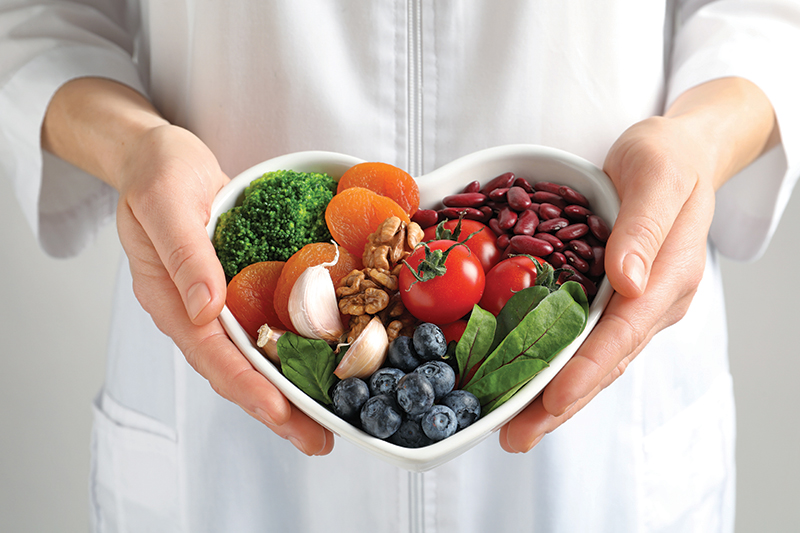Menopause is a natural phase of life—it is going to happen, so instead of fearing it, we need to embrace it. We can start by following these tips to help ease the transition:
- Drink more water. Hot flashes are caused by loss of fluids—in Chinese
medicine, this is called “false heat.” - Eat juicy fruits and vegetables. Steam or sauté vegetables to retain moisture.
- Increase foods rich in calcium and vitamin D. Leafy greens like kale, swiss chard, spinach, and collard greens; tofu; sardines; and dairy (but watch out for fat and calories).
- Exercise regularly. Walking counts! Moving our bodies keeps our metabolism up, helping maintain a healthy weight. Keeping fat off—especially around the abdomen—is vital, since excess weight can increase the risk of heart disease.
- Eat foods high in phytoestrogens. Organic soy products (tofu, tempeh, edamame), flax seeds, dried fruits, garlic, peaches, berries, and cruciferous vegetables (broccoli, cauliflower, cabbage, and Brussels sprouts).
- Avoid coffee, alcohol, sugar, and spicy foods — all triggers for hot flashes.
- Avoid refined carbohydrates. They can increase cholesterol (and thus heart disease), weight gain, mood swings, and inflammation. A diet of whole grains helps reduce risk of heart disease, cancer, and premature death.
- Increase omega-3 intake. Omega-3 is found naturally in salmon, anchovy, mackerel, and avocados, and in supplement form as well.
Herbs Can Help
Anxiety, irritability, and insomnia can increase from the perimenopausal stage through menopause and beyond, depending on what is happening in your life that is causing you stress. There are herbs know as adaptogens that are excellent for calming stress and anxiety and are often used by women experiencing perimenopausal through postmenopausal symptoms. However, these powerful herbs should not be taken without the advice of an herbalist or doctor who is well versed in herbal medicine.
- Ashwaganda is a calming herb used for stress, anxiety, and insomnia.
- Black cohosh is prescribed for hot flashes but may have side effects like headaches.
- St. John’s wort is known for helping anxiety and depression but can interact with drugs, so consult with your practitioner first.
- Dong quai is a Chinese herb known for helping hot flashes and increasing energy.
- Korean ginseng helps with stress and low energy. It does have some contraindications, so do not take without a practitioner’s advice.
- Hops have been shown to help with anxiety, stress, and insomnia.
- Epimedium, a Chinese herb used in combination with other herbs, has been used for menopausal symptoms for thousands of years.
- Red clover has been shown to help with hot flashes, safest taken in tea form. Women with breast or endometrial cancer should avoid this.
There are many Chinese herbal formulas that can help balance women’s hormones, lessen irritability, and reduce heat by nourishing and promoting fluid production. These complex herbal formulas should only be prescribed by a qualified Chinese medical practitioner knowledgeable in Chinese herbal medicine. They can be taken as capsules, tinctures, powders, or raw herbs and may be customized or prescribed in standard formulas made for specific conditions.
Body–Mind Connection
An important step in managing menopausal symptoms is taking the time to slow down. When we are too busy we rush from one thing to the next, constantly keeping our stress hormones elevated. Excess cortisol can stimulate hot flashes, anxiety, and insomnia; it may also increase cholesterol and inflammation, leading to heart disease and adrenal burn-out. Slow down. Take a break a few times a day to focus on breathing, drink more water, and lighten your schedule. Meditate. Practice the time-honored Chinese traditions of qigong and tai chi, which have helped manage stress and menopausal symptoms for thousands of years.
Donna Bunte of Donna Bunte Whole Health is an Integrative Nutrition Health Coach and Chinese medical practitioner in Stamford, CT. Since 1995, Donna has been helping busy people manage their stress, diet, and health concerns using coaching, nutrition, herbal medicine, and mind–body techniques to reach their health goals.
She can be reached at her office at 203.698.0793, cell at 203.253.9885, or email: health@donnabunte.com.
Visit: www.donnabunte.com and find her on Facebook at: facebook.com/donnabuntewholehealth and Instagram at: instagram.com/donnabuntewholehealth/.
